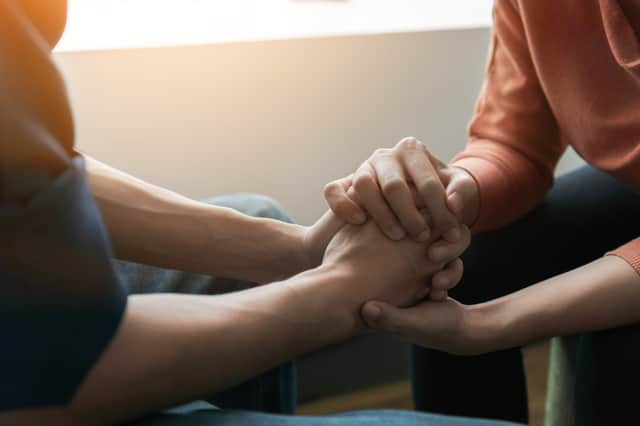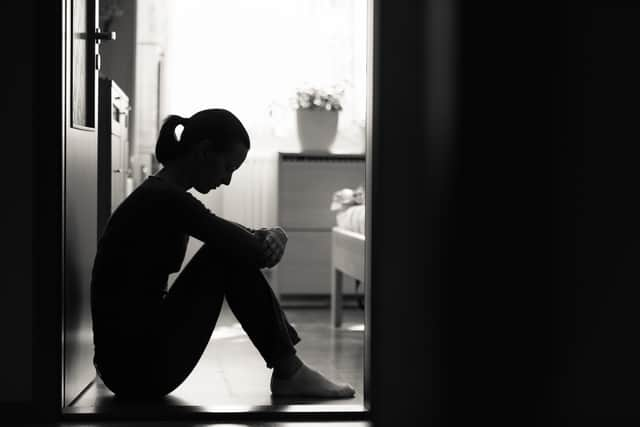Eating Disorder Awareness Week 2022: what are eating disorders and how can you get treatment?
This article contains affiliate links. We may earn a small commission on items purchased through this article, but that does not affect our editorial judgement.


Monday (28 February) marks the beginning of UK Eating Disorder Awareness Week 2022.
It is run by the charity Beat to raise awareness of the plight of the estimated 1.25 million people who have illnesses including anorexia and bulimia.
Advertisement
Hide AdAdvertisement
Hide Ad25% of cases are male and the illness can affect anyone, regardless of their age, sexuality or background.
So what are eating disorders, how can you get help - and what’s it like to live with one?
What is an eating disorder?
While the phrase ‘eating disorder’ implies a food-related health issue, the illnesses are actually mental health problems.
The precise cause of them is still not fully understood but is thought to be down to a combination of genetic, biological and cultural factors.


There are five main types of eating disorder:
Advertisement
Hide AdAdvertisement
Hide Ad- Anorexia nervosa: involves limiting food and drink intake
- ARFID (avoidant/restrictive food intake disorder): sees people avoiding certain foods or types of food, restricting food intake in terms of overall amount eaten, or both
- Binge eating disorder: typically sees a person eat very large quantities of food without feeling like they’re in control of what they’re doing
- Bulimia nervosa: involves a cycle of bingeing on food and then attempting to compensate for it by vomiting, taking laxatives or diuretics, fasting, or exercising excessively (all otherwise known as purging)
- OSFED (other specified feeding or eating disorder): when a person doesn’t match up with any of the principal symptoms of other types of eating disorder, they may be diagnosed as having OSFED
All forms of eating disorder are treatable and can lead to full or sustained recovery.
However, many people go undiagnosed because they do not realise they are unwell.
They can also be hard to spot by friends and family as people who have eating disorders may not necessarily lose or put on weight.
In fact, most people who have the illness are within what could be called a ‘normal’ weight range.
Advertisement
Hide AdAdvertisement
Hide AdIf you think you have an eating disorder, you can do two things:
- Get advice and support from Beat by calling its helpline on 0808 801 0677 or visiting its website
- Go to your GP
Treatment usually involves a form of psychotherapy, for example cognitive behavioural therapy (CBT) - a talking therapy that helps you to change the way you think and act.
What’s it like to live with an eating disorder?
To better understand what it’s like to live with an eating disorder, NationalWorld spoke to Dave Chawner, 33, from London who has previously lived with anorexia.
Dave is a stand-up comic who also runs Comedy for Coping - courses to give people who have eating disorders and other mental health problems coping mechanisms for their illnesses.
He is an ambassador for Beat.
I started getting [anorexia] symptoms when I was 16 or 17.
Advertisement
Hide AdAdvertisement
Hide AdI was weighing myself once a day and then it became in the morning and in the evening.
Eventually, I’d run home from school to weigh myself.
I properly realised I had an eating disorder when I was 20 and teaching English as a foreign language at a boarding school in Devon.
It was the first time I’d had no control over my food.
To try to get control back, I’d set my alarm for midnight to exercise and started trying to avoid meals.
But I ended up binge eating in front of people and then I started storing food in my room, which created a problem with rats.
Advertisement
Hide AdAdvertisement
Hide Ad

One of the other teachers saw me bingeing, becoming irritable and body checking (frequently looking at your body to determine weight, shape, size, or appearance).
This person had some experience of eating disorders and asked me if I’d ever thought I was anorexic.
I accepted I had anorexia but I didn’t do anything about it because I didn’t think I was anorexic enough.
It’s that blokey thing where you don’t want to bother the doctor about it.
But by three to four years later I had deteriorated.
Advertisement
Hide AdAdvertisement
Hide AdIt was a passive suicide attempt - I even started writing letters and recording videos for my niece for when I was gone.
Although I was underweight, I was never a Tim Burton skeleton.
I went to the doctor with depression and they referred me up the chain.
No one chooses to have a mental illness but they do choose to do something about it.
Advertisement
Hide AdAdvertisement
Hide AdI had a brilliant doctor who told me that if you don’t charge a laptop, it won’t work - so why do you expect your brain to work if you’re not feeding it.
I was diagnosed as severely clinically anorexic and had to have treatment fast-tracked as I was at risk.
Treatment involved two and a half years of psychotherapy.
People say ‘just talk’ which is lovely if you can.
But If I could just talk about it, I’d have done that myself - I needed someone to guide the conversation for me.
I’m still processing what caused my eating disorder. It wasn’t just one cause but a few things that led me in that direction.
A big part of it was not being able to process emotions.
Advertisement
Hide AdAdvertisement
Hide AdIt also started when I hit puberty and I think it was linked to sex drive.
I thought because I was having sexual urges, I was just another typical man who only thought about sex - I didn’t feel good enough.
Anorexia also dealt in numbers when life doesn’t.
I couldn’t get an A in my English exam, say, but I could make sure I got my weight down to X number or got my calories down to X figure.
The support I’ve had has been brilliant. I feel the furthest from my eating disorder than for a long time.
Advertisement
Hide AdAdvertisement
Hide AdA phrase I’ve heard that I like is that I feel I have retired from the eating disorder.
My biggest bit of advice for someone who’s currently trying to cope with an eating disorder is that recovery from an eating disorder doesn’t have to be about taking away.
View it as a way of gaining your life back - whatever that means for you.
A message from the editor:
Thank you for reading. NationalWorld is a new national news brand, produced by a team of journalists, editors, video producers and designers who live and work across the UK. Find out more about who’s who in the team, and our editorial values. We want to start a community among our readers, so please follow us on Facebook, Twitter and Instagram, and keep the conversation going. You can also sign up to our email newsletters and get a curated selection of our best reads to your inbox every day.
Comment Guidelines
National World encourages reader discussion on our stories. User feedback, insights and back-and-forth exchanges add a rich layer of context to reporting. Please review our Community Guidelines before commenting.
